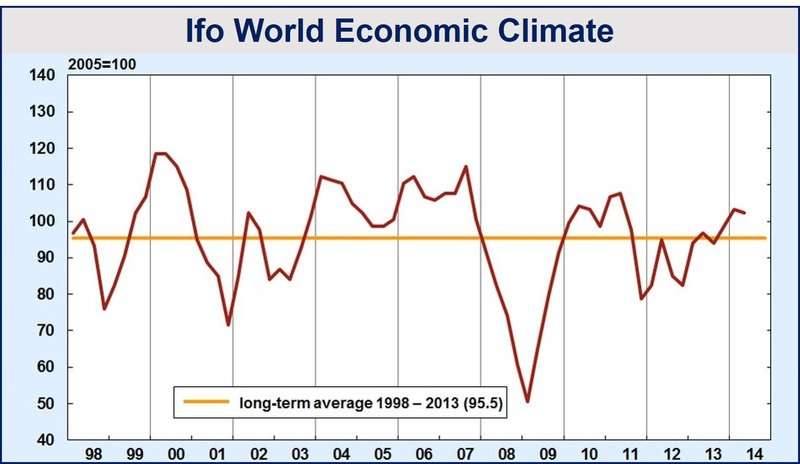The world economic forecast is marginally down, according to the Ifo Index, which declined to 102.3 points from 103.2. Although the six-month economic outlook has been lowered moderately, it “remains friendly overall.”
Experts at the CES Ifo Group Munich, Germany, predict the global economy will grow by 2.5% in 2014, broken down as follows:
- Europe +1.6%
- North America +2.5%
- Latin America +2.3%
- Asia +3.7%
Emerging markets slowing down
They explain that we will not see the high growth figures in Asia and Latin America that occurred in the recent past.
The authors wrote “The world economy continues to follow an upward trend, but is showing little momentum.”
The Ifo Index was climbing nicely until the beginning of this year.
Ukraine and Russia
The Ukraine crisis has seriously undermined the country’s current and near-future economic outlook, and also that of Russia.
GDP growth expectations for Russia for the next six months have deteriorated considerably. Russian experts are now forecasting just 0.8% growth for the whole of 2014. In fact, Russia’s Finance Minister, Anton Siluanov warns of possible zero growth.
Siluanov said in April that his country’s economy is facing “the most difficult conditions since the 2008 crisis.”
Andrei Klepach, Russia’s Deputy Economy Minister, predicted capital flight to the tune of $70 billion during the first quarter of 2014. Jittery investors are moving their money elsewhere.
Ukraine’s GDP is forecast to shrink by 2.5% this year.
Advanced economies improving
While the economies of North America and Europe appear to have found their feet again, those of the emerging economies in Latin America and Asia have slowed down considerably.
While North America and Europe surge ahead, Asia has slowed down significantly (2005=100)
North America’s Ifo index increased by +5.0 points, and by +1.9 points in Europe. In Asia the index declined by -7.9 points, in Latin America by -4.6, and in the CIS-states by -8.3.
Global inflation expectations are moderate, with the exception of some Latin American nations, particularly Venezuela and Argentina.
According to the Ifo Economic Climate Indicator, prospects in the Eurozone continue to brighten. The index for the second quarter rose to 123 points from 119.9, its highest level since 2007. The currency bloc’s economic recovery is expected to take shape more vividly in the coming months.


